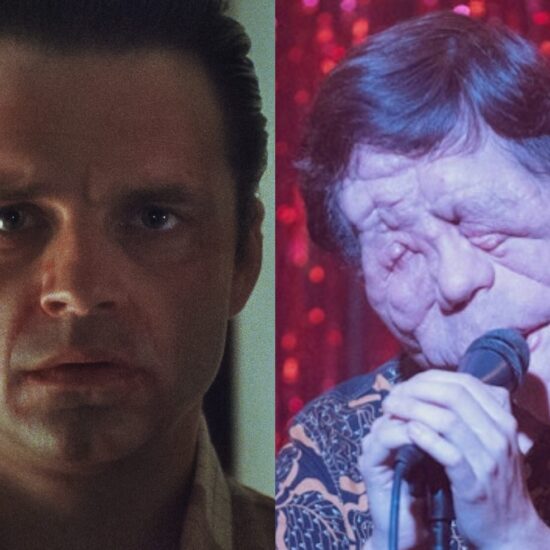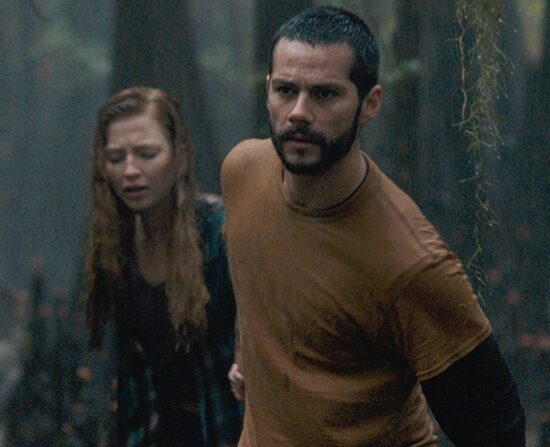
‘After Yang’
The director Kogonada’s vision of the future looks suspiciously like present-day Sedona, Ariz., the capital of woo-woo vibes: People wear loosefitting linen, always use their inside voices and appear preternaturally mellow. The mild mood even carries over to their jobs; Jake (Colin Farrell) runs a tea shop bathed in mood lighting.
To complete their happy family, he and his wife, Kyra (Jodie Turner-Smith), bought the “technosapien” android Yang (Justin H. Min) as an ethnically compatible sibling for their adopted Chinese daughter, Mika (Malea Emma Tjandrawidjaja). Unfortunately, one day Yang shuts down after a highly aerobic dance routine. Getting him fixed proves to be a trial because Jake, trying to save money, had bought a sketchy refurbished model.
At first “After Yang” feels like an unintended parody of the excesses of super-progressive parenting. But the film comes into its own when Jake gets access to Yang’s memory bank and is mesmerized by what he finds. It’s not just that the android had memories to begin with, but he was able to form emotions — an essential step to sentience. “After Yang” delicately explores what it means to have a conscience, or perhaps a soul, and also suggests degrees of acceptability when it comes to technology: Jake treats a robot as a member of his family, but looks down on neighbors with cloned children. Kogonada never deviates from a silky-smooth tone, but there are bristles underneath.
How could something that looks so innocuous — it’s a nice pastel color and just slowly drifts about — be so lethal? But it only takes 10 seconds of exposure to die from the pink cloud that has suddenly materialized around the world. So the authorities order people to shelter in place, wherever they happen to be. For Yago (Eduardo Mendonça), this means the apartment of Giovana (Renata de Lélis). When they had sex together for the first time, the night before the cloud’s arrival, they did not realize they would be stuck together for the next few days. Which turn into months. Which turn into years.
Lest they be tempted to dismiss the Brazilian director Iuli Gerbase’s film as jumping on the Covid-19 bandwagon, viewers are informed at the beginning that “The Pink Cloud” was written in 2017 and shot in 2019. Any resemblance to a pandemic involving extended periods of lockdown is purely coincidental.
The fablelike movie describes a life spent indoors, with a droll, semidetached tone that makes it easy to overlook the plot holes. Instead we focus on the vagaries of Yago and Giovana’s grudging cohabitation, like “Scenes From a Forced Marriage.” With no end to the confinement in sight, the characters handle their de facto incarceration in two very different ways — and each feels entirely understandable.
Stefon Bristol’s debut feature makes up for a limited budget with outsize smarts and heart. (People noticed: The director is working on a thriller starring Jennifer Hudson, Milla Jovovich and Quvenzhané Wallis.)
Best friends C.J. (Eden Duncan-Smith) and Sebastian (Dante Crichlow) are happy teenage nerds who attend the Bronx High School of Science and apply their tech skills to odd jobs around their East Flatbush neighborhood, like refurbishing neighbors’ laptops. Their big project, however, is a time-travel device. When C.J. and Sebastian finally succeed in turning back the clock by one day, they become embroiled in a case of police brutality that they desperately try to prevent in successive return trips. This only creates ripples of consequences that the overwhelmed kids — who had been warned by a teacher, Michael J. Fox in a sweet cameo — can’t control. You can read the ambiguous ending as a suggestion that the cycle of violence may feed on itself eternally, or opt for a more optimistic interpretation.
The influence of Bristol’s mentor, Spike Lee (who serves as the producer) is evident throughout, especially in the neighborhood scenes, which have a naturalistic verve, and in Bristol’s confident, efficient directing.
The 18th-century fairy tale “Beauty and the Beast” has inspired many adaptations, with this Japanese film counting among the finest — and certainly among the most emotional. Which is not all that surprising since it’s by Mamoru Hosoda (“Wolf Children” and the Academy Award-nominated “Mirai”), one of anime’s greatest directors. The story revolves around Suzu, a high school student struggling to overcome the grief caused by her mother’s accidental death. Suzu finds an escape in the virtual world of U, where she becomes the wildly popular singer Belle. Eventually she meets the Beast, a huge demonlike figure hunted by Justin (essentially the Gaston character). Hosoda skillfully alternates between Suzu’s naturalistic home life and the fantastical, beautifully designed U. But where “Belle” truly shines is in the way it shows how kids deal with death and violence. Those topics are delicately suggested and depicted as a part of everyday life we must learn to navigate. After Suzu and her friends spend a good amount of time trying to figure out who hides behind the Beast avatar, the reveal is emotionally devastating in a way that feels entirely earned, as is the film’s epilogue.
‘Strawberry Mansion’
Hope you don’t mind watching people munch on fried chicken, because it happens a lot in Kentucker Audley and Albert Birney’s whimsical indie film. A fried-chicken shake is even on offer, because we are in 2035 and the world has gone mad.
Actually, you could easily picture a fast-food chain selling such a novelty delicacy right now, whereas the movie’s real subject — that dreams have become taxable — is a little more remote a possibility. Or is it? The commodification of imagination is not new, after all, so the movie feels like it is only a few steps ahead of us.
James (Audley) is an auditor checking in with Arabella Isadora (the delightful Penny Fuller), an older lady who has not paid her dues in quite a while. At least she had the sense to record her dreams on antique VHS tapes, which James sets out to watch. The filmmakers evoke the gently mischievous psychedelia of the 1960s and ’70s (with a good assist from Dan Deacon’s score), and even when “Strawberry Mansion” gets confusing, it’s hard not to keep going, if only to see what nutty details are in store. Look for the terrific character actor Reed Birney (Albert’s uncle), giving the movie a jolt as Arabella’s awful son.













